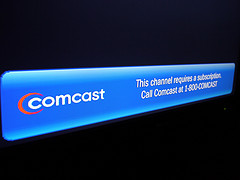Former Customer Claims Comcast Error Ultimately Cost Him $26,000
According to the man’s complaint, he canceled his Comcast cable and Internet service in June 2010 and a Kabletown tech came out to remove all the company-owned equipment from the customer’s home. He was supposed to receive a refund of $123.19, but the tech accidentally left behind a modem, for which the former customer was hit with a $220 charge.
The man says he notified Comcast of the error and he received promises from the company that it would correct his account. But the bogus charge was sent to a debt collector and the three credit reporting agencies were told that he owed this debt, harming his credit score.
In the suit, the plaintiff alleges that even after the debt collector agreed to stop collection actions, it did not alert the credit bureaus to this change. The man claims that the damage done to his credit resulted in him paying 1% more ($26,000) than he should have to refinance his home.
Adding insult to injury, the plaintiff claims that he still hasn’t received the $123.19 refund he was promised more than two years ago.
Comcast recently asked the court to dismiss a number of the plaintiff’s claims.
The former customer alleged that Comcast was acting in bad faith and points to the “fact that Comcast’s errors and misrepresentations occurred at least three times to a single customer” as sufficient evidence to infer that “Comcast’s actions were not merely a simple ‘mistake, misunderstanding, or oversight,’… but rose to the level of bad faith.”
But the court sided with Comcast on this issue. “The accounting mistakes made by Comcast in handling [the customer’s] account – while unquestionably frustrating – do not raise an inference of bad faith sufficient to state a claim for breach of the covenant,” writes the judge.
It also succeeded in getting claims of constructive fraud dismissed because the court found that the plaintiff did not have the “confidential relationship” with Comcast that such a claim requires.
Comcast could not, however, shake the negligence claims made in the lawsuit, and it did not seek to dismiss the plaintiff’s breach-of-contract claim.
[via Courthouse News]
Want more consumer news? Visit our parent organization, Consumer Reports, for the latest on scams, recalls, and other consumer issues.


